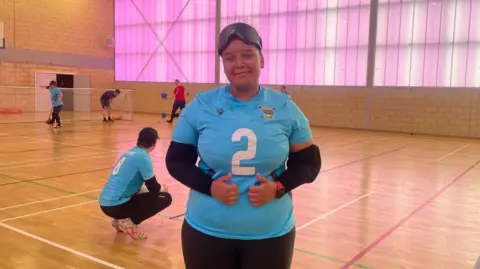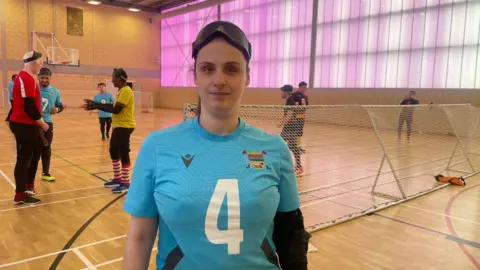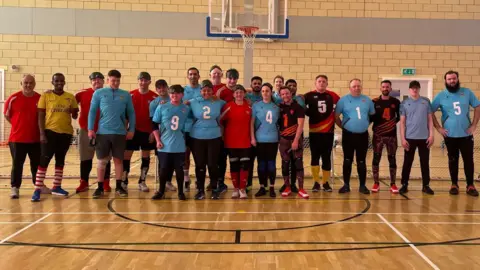Blind athletes say goalball helps beat isolation
 BBC
BBCIn a sports hall in Birmingham, players listen carefully for the sound of a bell jangling inside a ball, which has been designed with holes to make sure it bounces slightly as it rolls.
The sport they are playing is goalball, which is a game specifically designed for people who are blind or have a visual impairment.
It is played on an indoor court that is about the same size as that used in volleyball, with tactile lines including string and tape to help players orientate themselves.
Nansi Hidrej, who has played for Birmingham Goalball Club for almost six years, said she had struggled with her mental health during her teens but the sport had helped her through it.
"We're always able to motivate and uplift each other," she said.
"It's also such a good opportunity and chance to reduce the isolation a lot of disabled people face, to make friends."

Ms Hidrej says she is able see light and dark as well as shadows and a little bit of colour.
All players, however, wear blackout eye shades to ensure they are all equally dependent on their sense of hearing when they are playing.
It means people with varying levels of sight can play, including those with no visual impairment.
During a match, there are three players on each team, and the aim is to get the ball into the opposing team's net.
"It's really, really competitive, really fun and really, really enjoyable," Ms Hidrej said.
Alex Ulysses, another player for the club, has worked her way up to earn a place on the high-performance programme with Goalball UK.
Her first international outing was at the European Para Youth Games in 2022, and she made her international debut in Berlin earlier this year.
"I never thought I'd be travelling up and down the country on my own, so that's brought out the confidence in me," she said.

Coach Trevor Wills said there were plenty of opportunities for people to get involved and volunteer with goalball.
"These guys are absolutely amazing to work and play with," he said.
"The sense of trust that each player puts in each other - because obviously if you're blind you can't see, so you're trusting the other players and coaches to ensure you're safe."
He said he was blindfolded during part of his training to become a coach, and this had given him an appreciation for how much the players depend on the people around them.
"I had to actually run blindfolded towards a sound, and it's all about trust - you're putting your trust in the person that is giving you the signal," he said.
Follow BBC Birmingham on BBC Sounds, Facebook, X and Instagram.
